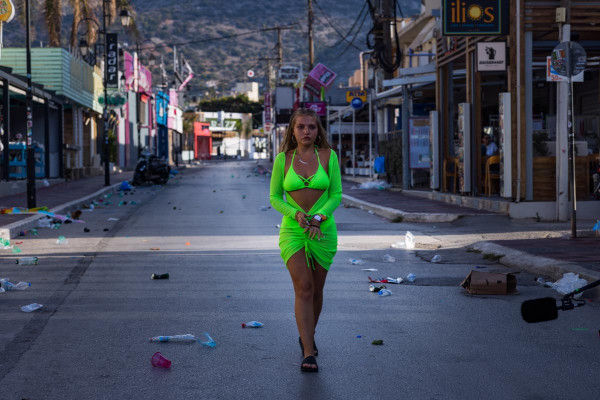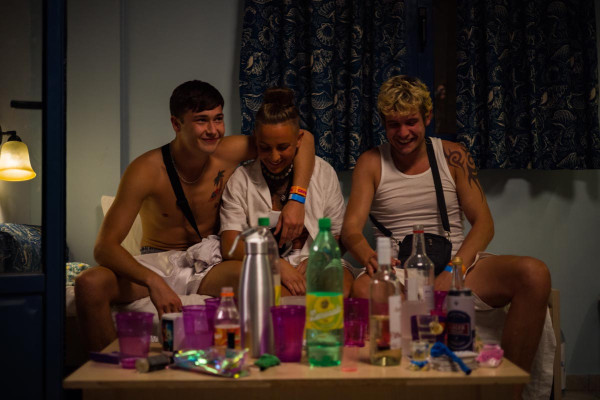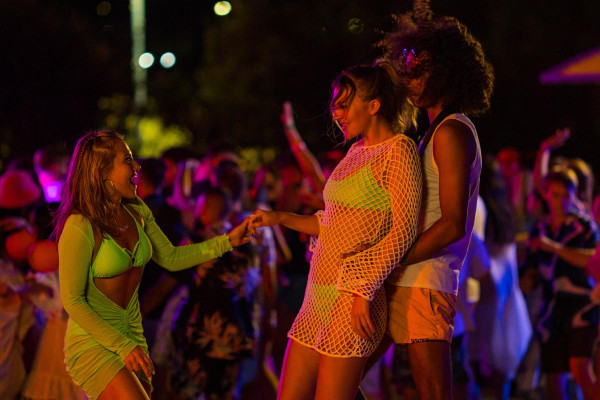Content warning: This entire article explicitly discusses rape and sexual violence, and includes spoilers for the film ‘How To Have Sex’.
Finding out a movie is about sexual violence usually puts me off from watching it.
I’ve seen too many shit depictions of assault on screen, where the content is unnecessarily graphic or feels very unrealistic.
How To Have Sex showed me the most realistic portrayal of sexual violence I’ve ever seen in a film and I can’t stop thinking about it.
Written and directed by Molly Manning Walker, How To Have Sex (HTHS) is a coming-of-age drama following three British high school teens who spend their summer drinking and clubbing in Greece.
Sixteen-year-old Tara plans to have the best holiday of her life but her world is turned upside down when she gets raped.

Tara walking down a street after the night of her assault. Photo: Nikolopoulos Nikos
The film shows the harmful ways young people can think about sex, and the characters in this film vividly reminded me of real people I know.
I spoke to Anita Lowry, CEO of sexual violence prevention organisation RespectEd Aotearoa, about my five biggest takeaways from watching HTHS.
Violating someone’s consent is still rape, even if there is no aggression involved
There are no physical fighting or screaming scenes that accompany Tara’s rape.
The film instead shows a subtle and insidious kind of sexual violence that I found much more realistic and common.
When Tara finds herself isolated on the beach with her male friend, we see her saying no to a lot of things that happen to her, like when he throws her into the cold water or touches her while they swim.
Sexual violence prevention campaign Thursdays In Black defines positive consent as being freely given, informed, enthusiastic, mutual, ongoing and reversible.
So when Tara says a quiet “yes” to sex, the consent she gives isn’t real consent because she is pressured into it.
Tara’s consent doesn’t meet any of those standards outlined by Thursdays in Black and her experience is rape even if the perpetrator wasn’t overly violent with her.
“We only like our rapists to be bad, scary men who hit us, instead of friends, flatmates, partners or family members,” RespectEd Aotearoa CEO Anita Lowry (Ngāti Kahungunu ki Te Wairoa, Ngāti Porou) says.
She says it’s harder to identify an assault as “purposeful rape” if the consent given sits in a grey area.
Lowry also says people are more likely to admit a survivor was raped than they are to call a perpetrator “a rapist” because they prioritise protecting the perpetrator’s feelings.
Leaning into the stereotype that sexual violence is always outwardly aggressive can prevent people from recognising its more subtle forms.
People are more likely to be sexually harmed by someone they know
Tara and her friends spend the entire film partying, drinking, smoking and losing themselves in crowds of equally drunk strangers.
I read the synopsis before watching the film so I assumed Tara was raped by a random person she met in a dark alleyway after having a wild night out on the town.
That assumption leans into victim-blaming — I thought Tara’s constant partying had something to do with why she was raped.
But she’s assaulted by a man who stays in the hotel room next to hers, someone she considers a friend.

Tara’s new friends who stay in the hotel room next to hers. Photo: Nikolopoulos Nikos
Lowry says the people you know are much more likely to sexually harm you than random strangers.
In New Zealand, 37% of sexual assaults recorded between 2020 and 2021 were perpetrated by strangers, according to the 2022 New Zealand Crime and Victims Survey.
And around 63% of sexual assaults recorded in that time period were perpetrated by someone the survivor knew, the survey found.
Survivors are more likely to report sexual violence to the police if they were harmed by a stranger because “the barrier to disclosure is lower”, Lowry says.
If an assault occurs in a situation where there is a lot of alcohol, Lowry says most people would assume it would involve a stranger spiking someone’s drink with drugs.
“But a lot of drug-facilitated sexual assaults are done by friends of the survivor, people they know,” she says.
Survivors can be raped more than once by the same person
I went into How To Have Sex knowing it was a film about sexual violence so when Tara was raped the first time, I wasn’t shocked.
I was shocked when she was raped a second time by the same man.
It’s because I held this bizarre belief that a perpetrator could only harm a survivor once before something was done about it.

Tara in How To Have Sex. Photo: Nikolopoulos Nikos
“If you know the person who harms you… After the first act of violence occurs, you’re not immediately going to be able to sever all threads connecting you to that person,” Lowry says.
She says a perpetrator who is a friend will be “in your space and accepted by your community” which makes further acts of violence more likely.
Instead of seeing them as separate acts, Lowry says to think of it as “one long period of violence” which is enabled by the enviroment and factors like rape culture.
Most survivors of sexual violence won’t report their story to the police
Unlike other films about sexual violence, How To Have Sex does not include any scenes where Tara is convinced to tell her story to the police.
Very few survivors actually report their sexual harm to the police.
In New Zealand, 94% percent of sexual assaults that occurred between 2018 and 2019 were not reported to police, according to the 2019 New Zealand Crime and Victims Survey.
Lowry says one of the main reasons survivors don’t turn to the police is because they “minimise the harm they have experienced” and try to “push on with life”.
58% of survivors who reported sexual assault between 2021 and 2022 said they thought their assault was “too trivial” to report to the police, according to the 2023 New Zealand Crime and Victims Survey.
She says there are many free services and community organisations that survivors can report harm to, like Wāhi Mārie–Sexual Assault Services in the Wellington region which conducts free forensic tests.
Lowry says the service will hold test results for decades so that if a survivor decides to report an assault years after it happens, they have access to forensic evidence.
She says people can always reach out to crisis services and helplines for immediate support and that there are health pathways for anyone who has experienced physical harm from sexual violence.
Survivors of sexual violence cope with trauma in different ways
After experiencing sexual violence, Tara doesn’t have a big breakdown or dissolve into a puddle of tears.
She switches back and forth between laughing and dancing with her friends, and dissociating and emotionally shutting down.

Tara partying with her friends. Photo: Nikolopoulos Nikos
Tara displays signs of someone who has been traumatised but her friends don’t observe her behaviour closely enough to pick up on them.
Different people have different responses to trauma and in Lowry’s past experiences of working with survivors, she says she “did not see a load of screaming and crying”.
She says many survivors bury their emotions down and focus on the fact they still “have a life to live, shit to do, bills to pay, kids to feed”.
Lowry says an emotional breakdown is not always immediate and can come far into the future, when a survivor is eventually triggered by something.
The best way to respond to a disclosure
If someone you know has been sexually assaulted, Lowry says you should actively listen to them, let them hold the narrative and give autonomy back to them.
She says you should “really allow them to make their own decisions” because if they had their autonomy taken away from them, you can help restore it.
Creating an environment within your friend groups where people can speak freely and be believed is the best thing you can do, Lowry says.
“You don’t need to investigate and dig into your friends because people will speak up in their own time.”
Things can get complicated if you’re friends with the survivor and the perpetrator but Lowry says to take things step by step and figure out what your priorities are.
“If your core focus is supporting [the survivor] then focus on that. Just doing one thing really well is awesome,” she says.
Lowry recommends referring survivors to sexual violence services because they are free and the people working there are trained to take care of them.
She says friends of survivors can also reach out to these services and ask for advice on how to be a good support person.
“For victim-survivors, I’d say: be with your people. Don’t be alone, let your whānau love you.”
Where to get help:
- 24 hour nationwide helpline Safe2Talk: 0800 044 334
- 24/7 helpline Wellington Sexual Abuse HELP: 04 801 6655
- RapeCrisis directory to services across the country: www.rapecrisisnz.org.nz
- (Not for crisis support): For education programs around preventing sexual violence: RespectEd
- Male Survivors of Sexual Abuse Aotearoa: www.malesurvivor.nz
- To report your experience to the police, call 111 or the non-emergency line 105
More stories:
'The system is so binary’: How the software GPs use is harming queer patients
“The impact this lack of data storage has on patients is huge.”
We both survived abuse in state care, 45 years apart
250,000 children, young people and vulnerable adults were abused in care from 1950 to 2019.
The fight to preserve the memories of March 15 victims
As New Zealand moves on from March 15, Muslims try to keep the conversation going.